By Tim King
Tarbox Farm, on Westport Island in Lincoln County, is a diversified vegetable farm that includes 9 acres of cultivated land and 40 acres of woods. It is also home to Maine’s only certified organic brewery.
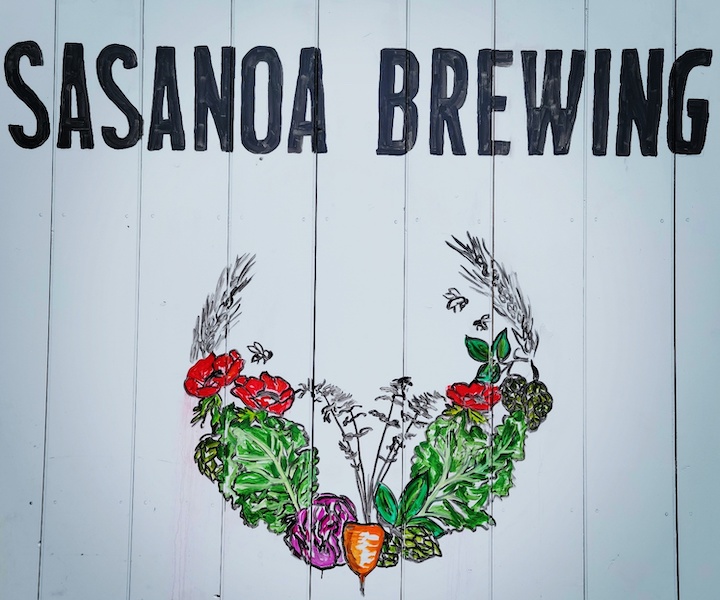
Last season owners Kyle DePietro and Angie Trombley, with help from an intern and some part-time help, grew an array of organic vegetables including: salad greens, tomatoes, beets, carrots, scallions, onions, salad turnips, kale, chard, head lettuce, peas, peppers, eggplant, fennel, radish, onions, potatoes, shallots, radicchio, winter and summer squash, broccoli and broccolini, and cauliflower. They also grow cut flowers and culinary herbs, care for a small orchard and vineyard, and wildcraft fruit. Several beehives and some heritage breed pigs are part of the mix as well.
The farm’s bounty is sold at the Bath summer and winter farmers’ markets and through a thriving Community Supported Agriculture (CSA) program. Additionally, Trombley and DePietro sell Tarbox Farm produce wholesale to several local restaurants, natural food stores and specialty shops.
With a business of this scope, you would not expect the couple, who are raising three boys, age 12 and younger, to add another enterprise. But, starting in 2018, Tarbox Farm became home to Maine’s only commercial farmstead brewery — which also happens to be the state’s only MOFGA-certified organic brewery. They named it Sasanoa Brewing after the river that borders the farm.
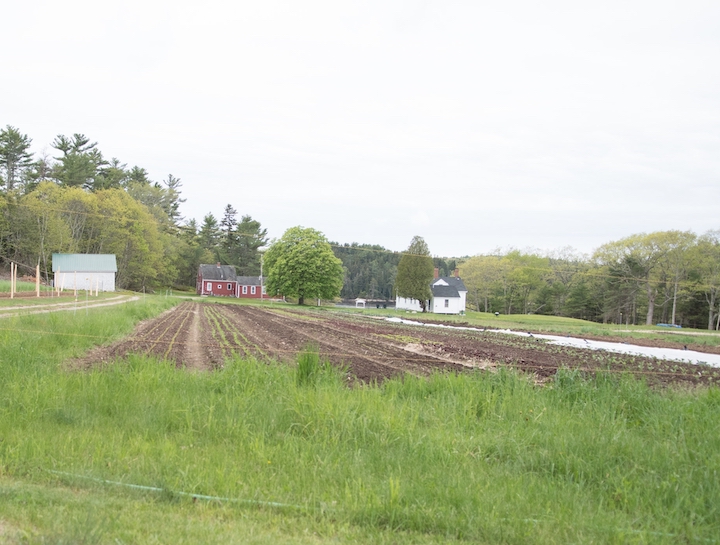
By then Trombley and DePietro had been brainstorming for several years about a non-perishable product that would fit nicely into their farm model.
“Kyle and I are a good team,” says Trombley. And, as a good team they were looking down the road to a future when they might not be able to manage the hard work and relentless pace of intensive vegetable farming.
“We can’t farm forever,” Trombley says. “So, with a non-perishable product there’s not as much risk as there is with vegetable farming. You don’t have to worry about tomato hornworm or some other pest damaging your crop.” The farmers also wouldn’t have to worry about the relatively shorter shelf life of their produce.
To explore ideas the couple obtained a grant from the Maine Farms for the Future Program operated by the Maine Department of Agriculture, Conservation and Forestry. Trombley says the idea for an on-farm brewery didn’t come directly out of it but that the program was very helpful in teaching them about business planning.
“What we wanted with this non-perishable product was for it to be very much in line with what we were already doing on the farm,” she says. “We wanted something that could be certified organic and something that was consistent with our sense of stewardship and tradition on this farm.”
The idea for the on-farm certified organic brewery germinated from the soil they had been farming for over a decade and from seeds planted in DePietro’s former life in the brewing business.
When he was 19, DePietro took his first job in the brewing industry at Times Square Brewery, in New York City, where he apprenticed under a German brewmaster. Later he worked at Mountain Valley Brewing in Suffern, New York, where he learned bottling and other brewery skills. And, before becoming a farmer, DePietro was the assistant brewer at Brooklyn Brewery in New York.
After roughly seven years of brewing in various capacities, DePietro knew some things about beer.
Along with DePietro’s experience, Tarbox Farm had a barn that housed the produce washing station and a kitchen for interns to prepare their meals in. With some work, an artisanal brewery fit very nicely into what the couple refers to as “the heart of the farm.”
But a brewery in a barn is not necessarily integrated into the farm that it is located on. DePietro and Trombley were, and are, determined to make it as much a part of Tarbox Farm as the fields and greenhouses.
The farm to brewery connection is expressed in the beers DePietro has created as Sasanoa’s brewmaster. The beers are made with farm-grown ingredients such as strawberries, cranberries, ginger, rhubarb, turmeric and lime basil. Tarbox Farm also raises their own Cascade hops, a variety developed by USDA hops breeders at Oregon State University and first used commercially by San Francisco’s venerable Anchor Brewing Company in 1975. Cascade hops impart a pleasant, flowery, spicy, citrus-like quality with a slight grapefruit characteristic.
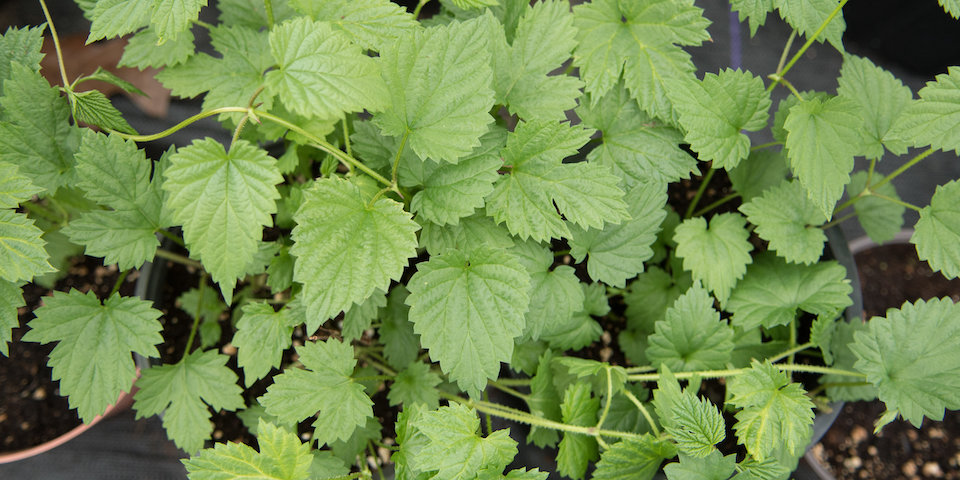
Sasanoa’s Cascade harvest is brewed into a signature beer called Hop Barn.
“Each year we celebrate our hop harvest by brewing a saison that features our own hops,” DePietro says. “Hop Barn has a classic saison spice with a wonderful balance of bittering and floral notes.”
Saisons have a brewing history dating back at least 400 years, with roots in the French-speaking region of Belgium. “Saison” means season in French, and these highly carbonated fruity and spicy beers — “bières de saison” — were traditionally brewed in the winter for farm hands to enjoy through the harvest season.
Sasanoa’s Hop Barn follows the tradition for saisons, both in brewing style and thanks to its list of local ingredients.
“Typically, a saison was brewed on a farm with ingredients that were available to the farmers,” DePietro said in an interview with The Lincoln County News in 2018. “We’re kind of falling in line with that, working with what we have available locally.”
That makes Hop Barn a true farmhouse ale.
All of Sasanoa’s beers — the brewery’s website listed eight in 2022 — are saisons. Except for Hop Barn, however, they are not truly seasonal beers. What makes them saisons is the use of the distinctive Belgian yeast that gives these fairly dry brews their characteristic floral and spicy taste.
DePietro and Trombley chose to focus on brewing saisons because it sets them apart from other small breweries in Maine.
“I love brewing IPAs and more of the classics, but everyone does that, and there’s a lot of breweries in Maine, so we want to keep it close to the farm,” DePietro told The Lincoln County News. “Not to say we won’t brew one of those beers in the future, but we are kind of starting out with some off-the-beaten-path (beers).”
That was four years ago and Sasanoa has continued to blaze its own trail.
One of the traditional features of a farmhouse ale is that it is brewed with the ingredients that are available on the farm at the time it’s brewed. That fits perfectly with DePietro and Trombley’s desire to tightly link Sasanoa Brewing to Tarbox Farm. They like to refer to that connection as “farm-centric.”
Most of the brewery’s beers contain some ingredients grown on the farm. All of them feature 100% Maine-grown ingredients. Their Jordbaer, for example, features Maine-grown organic barley, wheat and hops, and the farm’s own organic strawberries and lime basil.
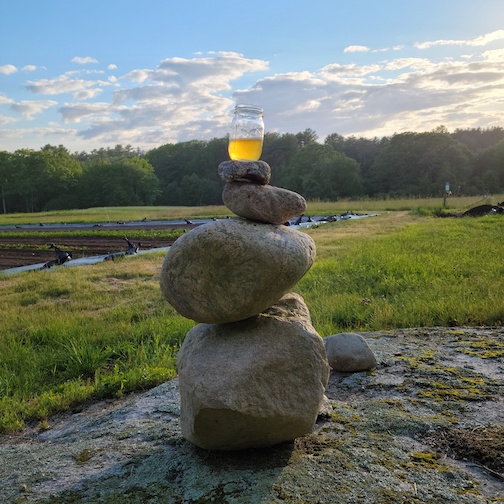
“We are committed to supporting local farmers and organic farmers,” DePietro says. “But it’s definitely harder to find organic ingredients than it is to find conventionally grown ingredients. Especially grains.”
DePietro speculates that the difficulty finding locally produced organic grains may be one reason why no other certified organic breweries have started in Maine. That turns the supply chain problem into a classic chicken or the egg dilemma.
“Maybe grain farmers don’t want get certified because there isn’t much of a market for organic grain,” he says.
DePietro and Trombley may not grow their own grains, but the grains they purchase still become part of Tarbox Farm.
“We want to close the loop and create a synergy here,” says DePietro. “So, we feed our pigs the spent grain. I had done that before for large breweries, but farmers had to decide whether it’s worth their time to come to the brewery to get it. For us, the pigs and compost pile are right here on the farm.”
When DePietro and Trombley started Sasanoa Brewing they were taking the long view. They wanted to create a non-perishable product that would be less physically demanding than raising acres of vegetables. That, they figured, would allow their business to continue as they became less able to keep up with the rigors of farming.
In the short term, however, the brewery has added to their workload. Especially, since they launched an open-air, weather-permitting, weekend tasting room.
“We were looking for somebody to train to run the tasting room this year,” says DePietro. “But we weren’t able to find anybody so now we do it together.”
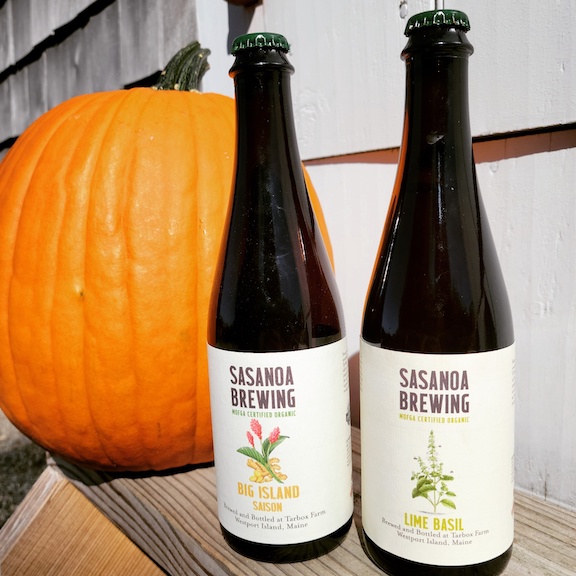
Running the tasting room, attending farmers’ markets and distributing to several dozen retail outlets that sell their beer in returnable 500-liter bottles — on top of farming — can take its toll.
“I need to meet everybody’s needs and take care of myself as well,” says Trombley. “Burnout is strong among farmers so over the years I’ve learned to become flexible and sometimes say enough and take a day off. We’re not good at doing that but you have to learn when to stop.”
At the same time Trombley knows that the land is a healing force for her, her family and those that they serve.
“People come out here on this beautiful land for something,” she says. “It’s more than the beer. It’s the sea! It’s the trees and the gardens. They come here and they can breathe deeply. I never get tired of it. There is so much of myself invested in it.”
About the author: Tim King is a produce and sheep farmer, a journalist and cofounder of a bilingual community newspaper. He lives near Long Prairie, Minnesota.
This article was originally published in the winter 2022-23 issue of The Maine Organic Farmer & Gardener.
